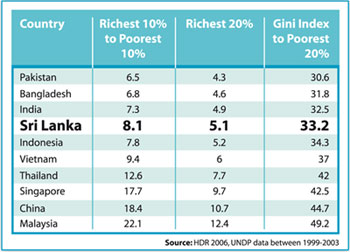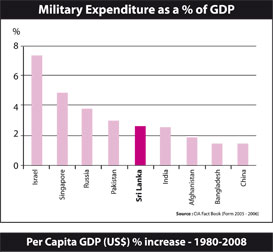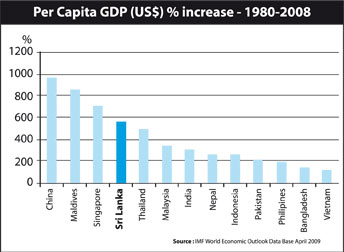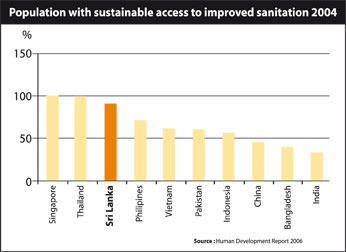|
The day after tomorrow:
Deceptions and truths of Sri Lanka's economic development
Manoj AKMEEMANA
 Any patriotic citizen in our country would not disagree that as a
nation, we Sri Lankans could proudly rejoice in the wake of a new era of
peace and harmony by defeating the LTTE, after three decades of
brutality and bloodbath by Tamil-Nazi terrorism. Any patriotic citizen in our country would not disagree that as a
nation, we Sri Lankans could proudly rejoice in the wake of a new era of
peace and harmony by defeating the LTTE, after three decades of
brutality and bloodbath by Tamil-Nazi terrorism.
After 500 years of colonial rule, we Sri Lankans seem to be obsessed
with a rather dull, defeated and backward mentality prevalent until our
cricketing heroes brought the honour of the world cup to our nation in
1996.
It gave us vigour and vitality to form a more positive mentality as a
nation, at least in the field of sporting.
Today, a historic opportunity is being created to stand up and march
as a winning nation in the world.
Today we are fortunate to observe that all over the country - North
to South; East to West; remote villages to affluent cities; a wide
spectrum of Sri Lankans without differences of race creed or religion,
proudly talk about defeating terrorism and a new hope for a new country.
The political leadership of President Mahinda Rajapaksa and the
incomparable professionalism and bravery of our Armed Forces created
this positive, victorious mind set among a wider section of our nation.
With new hope for a new era, we ought to look at the many challenges
facing us as a nation in a new perspective.
Over a long period of time, intellectuals, policy makers and
politicians talked about the Sri Lankan economy with a negative,
backward-looking connotation. Even today, in a gloomy world economic
crisis, this negative is fuelled and nurtured by many a person in a
superlative degree. Some politicians pray for a failed economic front to
satisfy party politics and the hunger for power, despite winning the war
against terrorism.
New terminology is a trend to wrap these negative economic
perspectives and most policy makers, politicians and intellectuals talk
about "winning the economic war".
Some assume that the connotation of winning the economic war may be
negative when comparing our economic development with regional
counterparts.
 The most popular comparison is the 1956 Sri Lanka and Singapore, and
Lee Kwan Yu's achievement to show how backward we are as a nation. The most popular comparison is the 1956 Sri Lanka and Singapore, and
Lee Kwan Yu's achievement to show how backward we are as a nation.
This Singaporean comparison obviously fuels the negative mindset
especially when comparing the experience of larger cities, its
architectural and infrastructure marvels, underground railroads, massive
expressways and colossal shopping malls which are sometimes much larger
than some of our suburban towns. No doubt Singapore has achieved a lot
and is a success story, but is it the correct example to compare
ourselves and assess our success or failure?
Greatest challenge
Today the greatest challenge is not winning the economic war, but
rather defeating the backward pessimistic mentality of interpreting our
development. Therefore, it is of utmost importance to defeat the
"Singaporean syndrome of development comparison" if we as a nation are
serious in building a new country for future generations. We need to
understand and appreciate our achievement in economic development during
the past three decades and compare it with other regional counterparts
and developed nations such as Singapore as well to fully understand
where we stand.
Those who talk about "economic development" sometimes forget that it
has a wider and more profound meaning than simply economic growth (GDP
growth) and per capita income. But development has many facets such as
improving the quality of a human life; social, ecological, political,
cultural development and equality in many aspects.
It's also more meaningful to compare how much we have grown during
the past three decades compared to other nations.
It is obvious that Sri Lanka's achievement over the past 28 years is
commendable compared to many of the other developing nations and is
closer to Singapore's growth than India.
However, this achievement of Sri Lanka becomes somewhat incomparable
when we consider the setbacks during this period, which include two JVP
insurrections, four Eelam wars of the LTTE, and the worst natural
disaster in modern history, the 2004, tsunami.
Extraordinary resilience
The Sri Lankan economy has shown extraordinary resilience to all
these man-made and natural disasters. During the past 30 years, Sri
Lanka has hardly had any peace due to uninterrupted terrorist attacks in
various forms by the LTTE. But in contrast to the popular argument that
military expenditure had dragged the economic development, it can be
argued that rather, it had helped create the resilience of the economy
in the face of the world's most ruthless and sophisticated terrorist
outfit.
It is evident that considering the regional resources as well as the
security threat level for the country, Sri Lanka has managed its
military spending within acceptable norms, as shown in the graph.
 Another important aspect is to analyse the manner in which a
country's economic benefit or growth is distributed or shared within its
population. This factor reflects the level of inequality and poverty of
a nation. The chart shows the level of inequality as indicated by the
Gini index among the regional nations. Another important aspect is to analyse the manner in which a
country's economic benefit or growth is distributed or shared within its
population. This factor reflects the level of inequality and poverty of
a nation. The chart shows the level of inequality as indicated by the
Gini index among the regional nations.
The lower the gap, the more equitable the distribution is. The
figures show that comparatively, Sri Lanka has cascaded its economic
benefits to lower levels of the society compared to many other countries
in the Asian region.
From another point of view, just imagine, if one can live a healthy
life and comparatively longer life span, have access to a decent
education, healthcare and sanitation facilities, are these not the
factors to identify the quality of life. If one can look at the 'quality
of life' of an average Sri Lankan without prejudice, we can see that it
has improved over the past 30 years in several aspects compared to most
of the other nations.
Deriving dividends
Critiques, both local and international including donor agencies and
nations criticized the "subsidies" given to health, education and other
public expenditure as non required expenditure for the state.
The local promoters for "market economies" have extensively
criticized using the taxpayer's money without having a "proper price
tag" for it. But the indicators reveal that as a nation, we are deriving
the dividends of our investments through these subsidies.
As a nation we can be proud that we have achieved a comparatively
significant development during the past three decades despite the fact
that we still do not have large manhattans and skyscrapers, expressways,
and reliable underground rail road's and other infrastructure.
But in a way, one could argue that Sri Lanka is the best achiever in
the Asian Region in showing a resilient, but determined growth,
considering the level of destruction and instability that had prevailed
during these three decades.
The author's objective for this article is not intended to infer that
the country should relax and day dream in a comfort zone, especially
during the worst global economic downturn in recent times.
 Instead it is to share a few facts and appreciate the progress made,
and invite all countrymen to be motivated to build a winning mindset to
face the new realities and opportunities created for us and to be rid of
the Singaporean syndrome of development comparison. Instead it is to share a few facts and appreciate the progress made,
and invite all countrymen to be motivated to build a winning mindset to
face the new realities and opportunities created for us and to be rid of
the Singaporean syndrome of development comparison.
It is said success breeds success, and a winning mindset brings
victories! As we have proved to the world that terrorism can be defeated
by a localized solution, we as a nation should have our own model for
economic development and to secure a sustainable position in the global
development.
Patriotism in the war front should be extended to the front of
economic development. The winning habit and the strategic military
mentality need to be extended to the socio-economic front. The change in
the mindset will then help us as a nation to reap the new opportunities
and take our country to the zenith of economic development.
Manoj Akmeemana is a Senior Banker in a leading private commercial
bank with over 19 years ' experience in Sri Lanka and overseas. |



